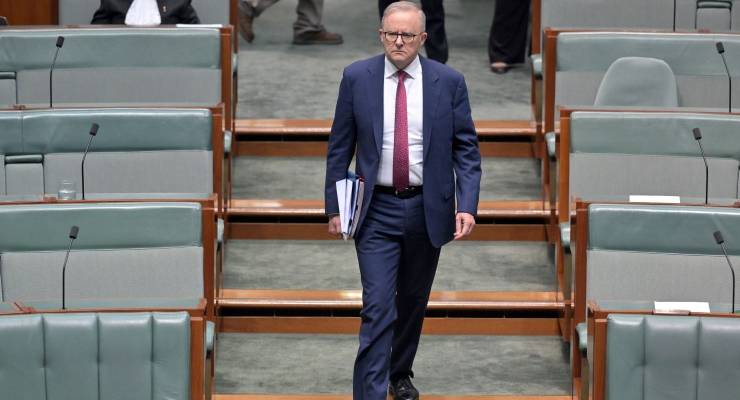
Much has been made of the government’s decision to change the stage three tax cuts, providing a bigger tax break for the majority of Australians at the expense of a smaller portion of people earning more than $180,000. Initially pummelled in the media as a backflip on Labor’s promise while in opposition that they wouldn’t touch the cuts, first introduced in 2019, the changes have since found broad public support, as shown by a number of polls, including Guardian Essential, Newspoll and one from The Australia Institute.
Much was made of the political strategy involved in the changes, as well as what was described by The Australian’s Dennis Shanahan as a “breach of faith [that] could prove to be politically fatal”, but very little was made in the national media of the actual impact of the policy.
Crikey sat down with a senior member of the press gallery, who requested to remain anonymous, to break down the optics of “the wedge”, what the term actually means, and whether it matters at all.
The “wedge”, a term invented by advisers to then-Republican US president Ronald Reagan, who served from 1981 to 1989, was described by the reporter as “a way of leveraging things that were good for the social good, by basically convincing people that it was bad”.
ANU academics Shaun Wilson and Nick Turnbull wrote in the 2001 Australian Journal of Politics and History that the “wedge politics” strategy was commonly attributed to a set of tactics used by Reagan staffer Lee Atwater, which “involved targeting unpopular or stigmatised social issues or groups as a way of defining ‘mainstream politics’ and linking political opponents to their support of these issues or groups”.
“By doing so, the tactics of wedge politics deliberately aim at undermining the support base of key political opponents in an attempt to gain political ascendancy or to control the political agenda,” they wrote.
Atwater would be best remembered for devising these strategies to weaponise racism against African Americans in the southern states, but these tactics did not make their way to Australia until the Howard administration.
“It was Howard who really utilised it,” the press gallery journalist said.
This reporter attributed much of Australia’s “social licence” changes to Howard’s politics and his use of wedges.
“He was a great student of conservative politics in general, in terms of messaging. When you look at Australia’s social licence history, we didn’t actually start properly demonising [groups] until around the Howard years.”
“[It] was effectively just pitting you against everybody else,” they said.
With the changes to stage three tax cuts also branded a wedge, and with popular support in a cost-of-living crisis (albeit this time utilised by the Labor Party), our friend said the Coalition was “suddenly faced with their own politics”.
Wedge politics itself, as seen under both Reagan and Howard, took advantage of social division, and leveraged it for political gain. The journalist described the Labor Party in opposition during the 2000s as “trying to get out of this cycle of wedge politics, where they couldn’t be wedged on something because they voted for it”.
Asked what it took to break the cycle, besides electioneering, the reporter said it was a reflection on the state of the nation’s media as much as anything else.
“It would take journalists not to completely focus on the wedge, and hold that up as a political tactic as something that is completely brilliant, and actually focus on politics that can lead to changes in how people deal with wedge politics,” they said.
“And it might be [brilliant politics], but it isn’t necessarily brilliant policy. And our job is to explain policy to people.”
“I think we need to do more to tell people about policy … rather than just running over political tactics. I don’t think that serves audiences very well.”
Asked why the press gallery tended to focus on the strategy over the substance, the journalist mused that it is because “we are part of the machine”.
“We’re up close, we cover the ins and outs. And when you’re talking to politicians, a lot of the time the conversation is around political strategy. You’ll often hear about ‘all the polls say this is great’, rather than ‘these are the benefits for people’ … we don’t hear so much of that in daily conversations.”
Does the media focus more on political strategy than policy substance? Let us know your thoughts by writing to letters@crikey.com.au. Please include your full name to be considered for publication. We reserve the right to edit for length and clarity.









Given that the ruling class has always waged war against the rest of us, I’m pretty stoked to see Labor finally waking up to the fact that it can drive a wedge between the top end of town and the general populace…
Here’s hoping it puts enough wind in their sails that they’ll actually decide to genuinely change tack and pivot against their corporate overlords, once the intoxicating buzz of actually serving the public interest has a chance to take hold, eh?
Just imagine a day when Labor wouldn’t balk at the notion of a coalition with the Greens. The tories would be ground into dust!
Intended or not, it has morphed into an extraordinary – potentially devastating – wedge.
With the “liar liar” attack not working, the some in the conservative commentariat have even adopted the line that tax cuts are bad for you.
Hah! Those jokers will turn on a dime so fast it’ll make your eyes bleed. Craven, wheedling, harlots.
It sounds fascinating. I’ve seen many Colaition and right-wing media attacks that bang on about bracket creep (presumably works with those who don’t grasp what bracket creep really is and therefore don’t see how silly the attack is). But I’ve not seen anyone on the ‘conservative’ side say tax cuts are bad. Could you please provide a couple of examples of them saying tax cuts are bad for you?
There are, on the other hand, those to the left of Labor who definitely believe, and are saying, the Stage 3 money being handed out in tax cuts, even after Labor’s revision of its distribution, could be better used in other ways.
I’m not your research assistant, but the most recent one was James Morrow 6th of Feb – most NewsCorp papers.
In 2022 he wrote an article with the headline, “Tax cuts the best way to fight the rising cost of living”Two days ago he described the very idea of tax cuts as a “sin” because “the system is rigged” and income taxes should be tied to inflation.
True, you are not my research assistant. But, when you say ‘some in the conservative commentariat have even adopted the line that tax cuts are bad for you’, your credibility improves if you provide examples. You make the claim, you back it up; this is standard, and there’s nothing unreasonable about a polite request for some evidence. Particularly with something such as this, where you now say the examples are from NewsCorp. Do you really expect me, or anyone else who wants to know which conservative commentators are saying such things, to get a NewsCorp subscription just to check your credibility? Credibility which is now hanging by a thread, given that you’ve met my request for a couple of examples — which hardly seems onerous when you have stated there are ‘some’, rather than ‘one’, more like the minimum — with just one example.
Have a great day!
What a sad indictment of our system that the thoughtful remarks of the journalist interviewed must be anonymous, when presumably he/she is free to put his/her name to all sorts of commentary on who’s ‘winning’ and what cunning technique they’ve used.
Too right. It’s pathetic. What does this “senior member of the press gallery” stand to lose by stating the bleeding obvious? And how much of their audience does the media actually lose to disengagement as a result of their horse race reporting of politics over policy?
Too kind. Wedge politics is fundamentally about gaining political advantage through bad policy. The wedge is a policy that the other party is obliged to oppose because it is bad, but that opposition can be manipulated, dishonestly and with malice, to attack the opposing party.
An excellent example is the Northern Territory Intervention, which Howard pulled out of a hat just before the 2007 election. It was a huge bill brought to Parliament with no warning. Rudd, for Labor, saw it for exactly what it was. If Labor opposed it, or even asked for time to read the bill, the Coalition would have gone to the election screaming to the heavens about Labor being soft on child abuse and every other alleged evil to be found in First Nation communities — because, according to Howard, the bill was a direct response to the shocking findings of the new Little Children are Sacred report. It did not matter at all that the report itself explicitly said such an intervention, with no input from the communities, would be no answer to the problems. So Rudd and Labor dodged the wedge by immediately voting with the government, and so the Intervention rolled into action. Rudd won the election, Howard’s stupid games did him no good, and the intervention continued at full speed. For years.
Morrison attempted some wedges so blatant that when Labor surprised him letting the relevant bills pass the Senate, Morrison immediately shelved them. Clear proof they only existed so Morrison could attack Labor for opposing them. In those cases, no real harm done in the end, just time and resources wasted in Parliament.
The worst of it comes up in those policy areas where the fear of being wedged is so great that no opposition is ever made to any proposal. National security and cracking down on crime (will anyone ever crack up?) always gets through with almost no debate except from independents and minor parties, no matter what the cost to basic freedoms and civil liberties.
The wedge is a policy that the other party is obliged to oppose because it is bad
I would have said it’s a policy that the other party is obliged to support despite its being bad. A whole series of oppressive ‘security’ laws were introduced by the three recent Liberal governments/PMs and more or less simply waved through by Labor simply because they didn’t want to be thought of as weak, or at least framed as weak by the Murdoch-led media pack.
I fully agree with the rest of your comment, particularly about the serial wedger, Morrison.
The knowing adoption of bad policy (often ‘populist’ in catering to various prejudices) as a wedge has the added bonus of leaving the opposition, were it to win the next election, faced with the problem of fixing a mess which it helped create by voting with the government. I’ve never thought the Libs were beyond such deliberately reprehensible politics; in any case, bad policy is in their nature. As you point out, the NT wedge was able to run for years.
The wedge is also handy for diverting attention from urgent important issues, demanding action, which would make them look bad because they’ve been ‘told’ to ignore it. And ignore it they will until hell freezes over or until nobody votes for the useless bastards any more!
It burns me up how terrible people are at judging risks, or even realising that statistics and other sciences are the best sources for informing such judgements…
Make sure to get all worked up about terrorists and kiddy fiddlers, and completely ignore that the biggest risk most people face on a day to day basis is the vast number of terrible drivers allowed on our roads, and that the future is doomed by extractive resources running amok, destroying our environment and fatally corrupting our governments.
I think “snookered” is the more apt term for what happened here.